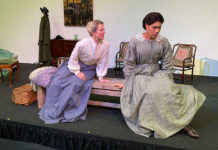
When a 9.1 earthquake shook the ocean floor off the east coast of Japan on March 22, 2011, it was the most powerful earthquake ever recorded in the area. The massive “megathrust” earthquake triggered enormous tsunami waves that raced six miles inland and reached heights of over 130 feet. The destruction was widespread, though what got the most international attention was the damage to the nuclear power plant at Fukushima.
“Most of the press that was plastered all over the media was about Fukushima, the nuclear reactor, which understandably is big news,” said Akira Tana, a jazz drummer who was producing records for the Japanese King label at the time. “But what happened was there was a tsunami away from the earthquake that took over 20,000 lives and destroyed villages north of Fukushima.”
Tana became involved in community fundraising in Marin County and on the Peninsula where he lives. The effort snowballed and resulted in the formation of Otonowa, loosely translated as “sound circle.” Tana and Otonowa will perform their music in Healdsburg on Saturday, Dec. 16, at The 222.
The group has been remarkably stable since it was formed, with Tana—an accomplished jazz drummer who spent much of his career on the East Coast, where he played with “all the greats”—as the leader.
Masaru Koga plays tenor and soprano saxophones, as well as a Japanese bamboo flute called the shakuhachi. Noriyuki Ken Okada plays the double bass, and while Art Hirahara usually plays piano, for the Healdsburg date Ben Stolorow will be on The 222’s new Yamaha DCFX nine-foot concert grand.
Appearing as a guest artist will be Jimi Nakagawa, a taiko drum master. A rare solo artist in the taiko tradition, which usually emphasizes the dynamic performances of group drumming, Nakagawa brings the smaller hour-glass shaped tsuzumi hand drum to the jazz group, and will perform alone as well.
Tana said that Otonowa has taken their music to the tsunami-devastated villages of Japan as a way of “providing a kind of spiritual support for the communities.”
The reception has been positive—perhaps in part because Otonowa’s repertoire is based on traditional Japanese music that predates the tsunami and the war.
“The music we play are Japanese folk and pop melodies, some dating back to the beginning of the 1900s or even earlier. So people know the music, at least the melodies, before we start improvising,” he said, laughing. He said their appearance encouraged young Japanese musicians to learn about jazz and the wide musical worlds it embraces.
A short film about Otonowa’s efforts will also be screened, with time for questions from the audience and answers from Tana and the other musicians. It’s an unusual kind of jazz event, brought to Healdsburg and The 222 by Jessica Felix, founder of the Healdsburg Jazz Festival.
“I wish there were more people like Jessica, you know, who care so much about the music,” Tana said.
Akira Tana and Otonowa perform on Saturday at The 222 stage, at Paul Mahder Gallery, 222 Healdsburg Ave. Program begins at 7pm; tickets $35-$75 at the222.org.







